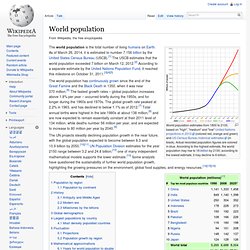

Society. A society , or a human society , is a group of people related to each other through persistent relations, or a large social grouping sharing the same geographical or virtual territory, subject to the same political authority and dominant cultural expectations. Human societies are characterized by patterns of relationships ( social relations ) between individuals who share a distinctive culture and institutions ; a given society may be described as the sum total of such relationships among its constituent members.
In the social sciences , a larger society often evinces stratification and/or dominance patterns in subgroups. Insofar as it is collaborative , a society can enable its members to benefit in ways that would not otherwise be possible on an individual basis; both individual and social (common) benefits can thus be distinguished, or in many cases found to overlap. Sociology. World Population Wikipedia. World population estimates from 1800 to 2100, based on "high", "medium" and "low" United Nations projections in 2010 (colored red, orange and green) and US Census Bureau historical estimates (in black).

Actual recorded population figures are colored in blue. According to the highest estimate, the world population may rise to 16 billion by 2100; according to the lowest estimate, it may decline to 6 billion. The world population is the total number of living humans on Earth. As of March 26, 2014, it is estimated to number 7.156 billion by the United States Census Bureau (USCB).[1] The USCB estimates that the world population exceeded 7 billion on March 12, 2012.[2] According to a separate estimate by the United Nations Population Fund, it reached this milestone on October 31, 2011.[3][4][5] Population by region[edit]